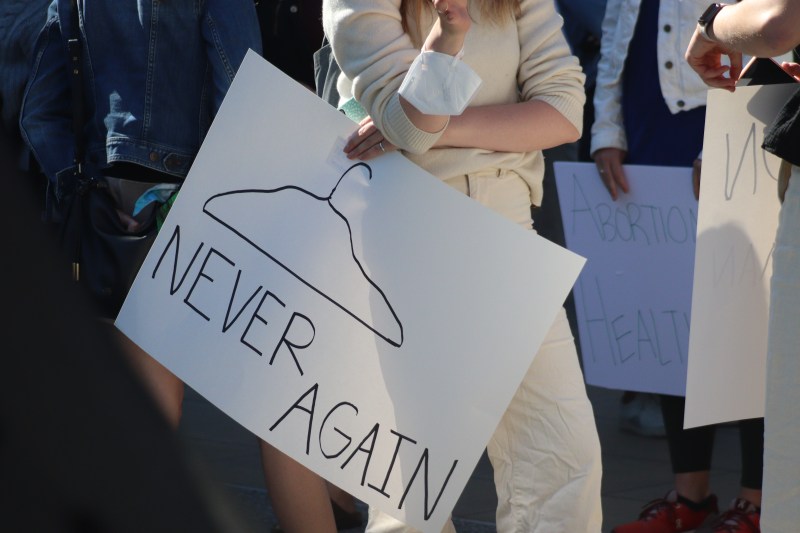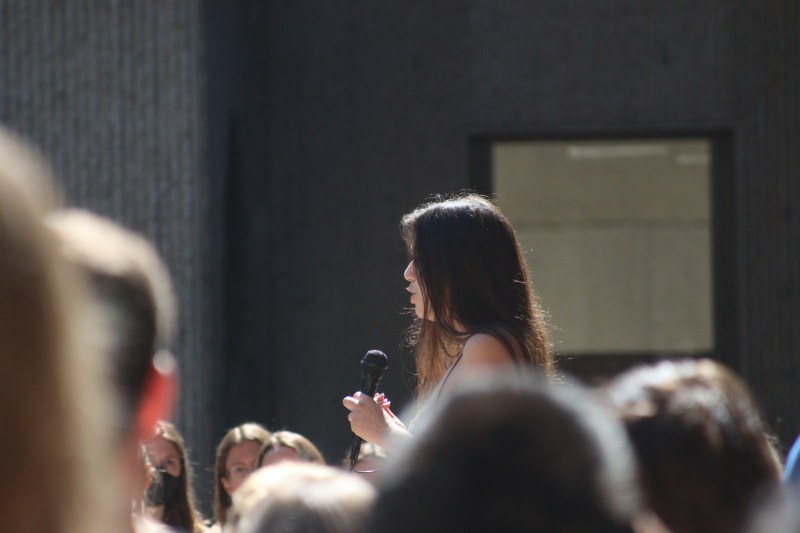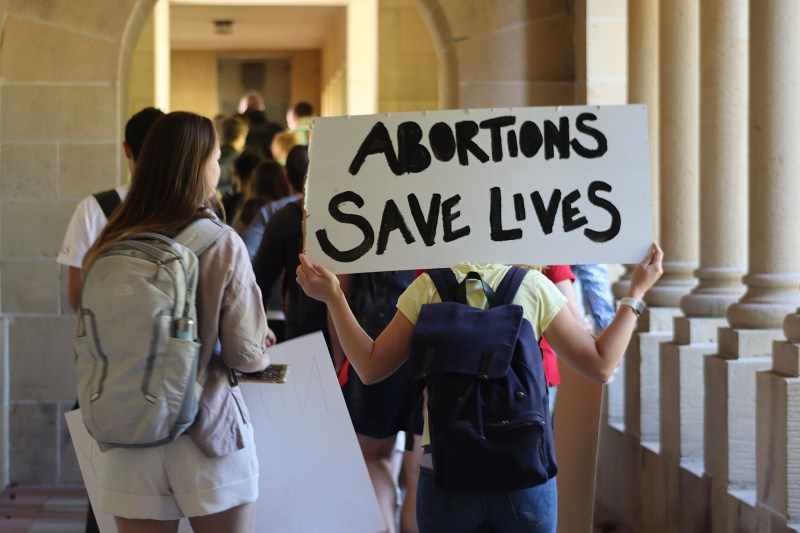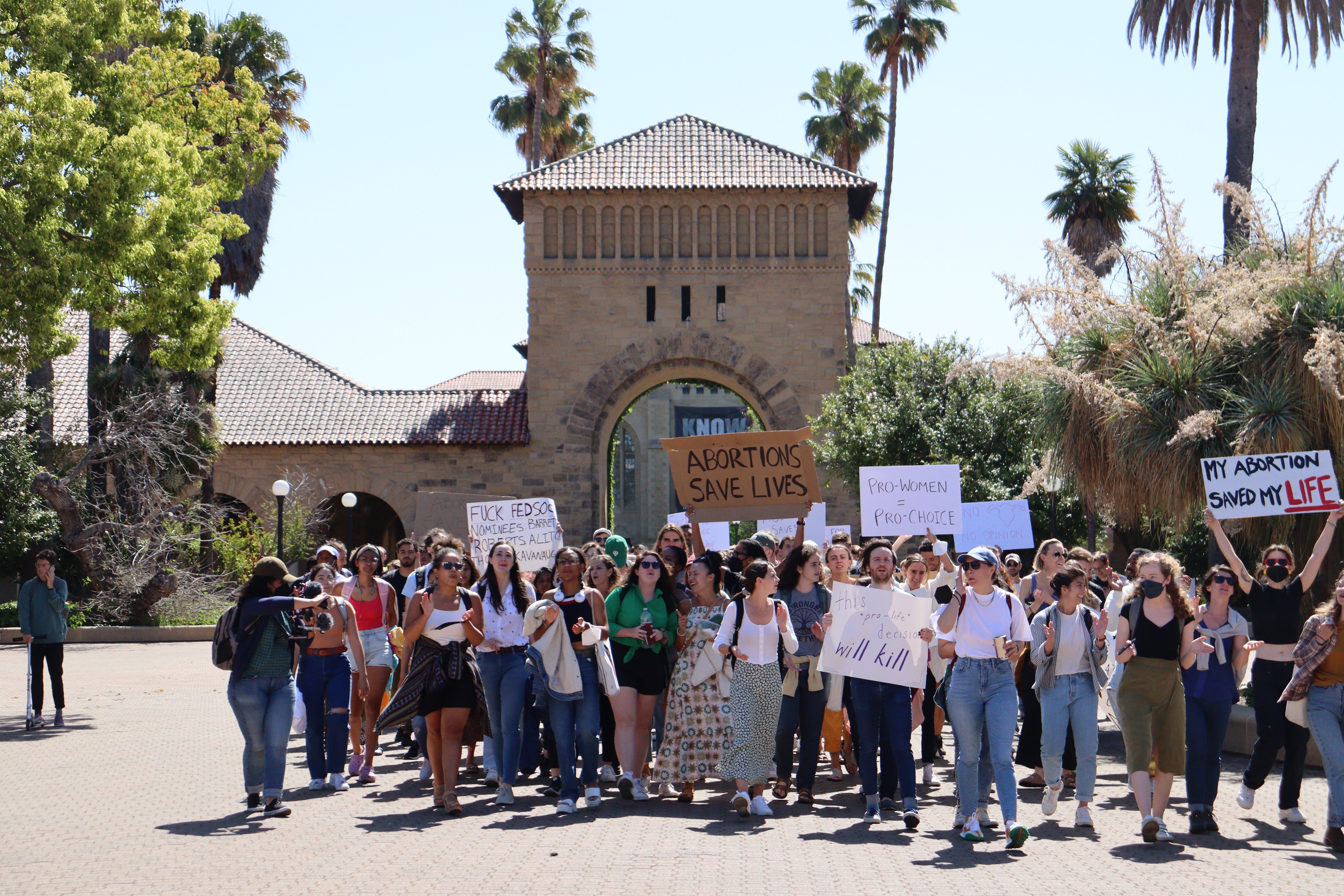Stanford Law School (SLS) students held a rally for reproductive rights in Cooley Courtyard on Tuesday morning in protest against reports that the Supreme Court is poised to overturn Roe v. Wade.
The rally comes after Politico published a leaked draft of a majority Supreme Court opinion overturning Roe. The case, Dobbs v. Jackson, addresses the constitutionality of a 2018 Mississippi law that prohibits abortions after 15 weeks of pregnancy and involves two notable Stanford affiliates. Mississippi Solicitor General Scott Stewart J.D. ’08 brought the case to the Court in defense of Mississippi’s law, while SLS professor Jeffrey Fisher is co-counsel for Jackson Women’s Health Organization.
Organizers, primarily first-year law students who walked out of their property rights class, criticized Stewart and encouraged attendees, who also included second- and third-year law students, to donate to a curated list of Black law organizations and abortion funds. After the rally, some protestors marched around campus while others broke off into groups to brainstorm policy ideas.
In the leaked opinion, Justice Samuel Alito writes that “Roe was egregiously wrong from the start” and argues that the right to an abortion is not guaranteed by the Constitution. If the ruling is finalized, reproductive rights will be left to state governments to decide, leaving many Americans without access to safe and legal abortions.
“We all know that the number of people who get abortions doesn’t change whether abortion is legal or illegal,” student organizer Sarah Corning J.D. ’24 said as she addressed the crowd. “The impact on low-income people and people of color will be extreme. It already is extreme in states like Texas and Mississippi, and Missouri and Oklahoma.”

One in four women will receive an abortion at some point in their lifetime, according to Luu D. Ireland at the UMass Chan School of Medicine. Black and Hispanic women receive abortions at higher rates compared to white women, and those who are more likely to have an abortion often come from lower-income communities.
Organizers also brought attention to how the decision will affect trans people. “Many trans people also require access to reproductive healthcare,” said Jess Lu J.D. ’24, the Co-President of SLS’ LGBTQ affinity group OutLaw. “We cannot talk about Dobbs without actively contending with racism, classism and transphobia.”
The rally focused on the role SLS has played leading up to this point and highlighted actions students can take moving forward.
Organizer Susana Gutiérrez J.D. ’24 called attention to the rates of sexual violence on Stanford’s campus. According to the 2019 AAU Climate Survey, nearly 40% of Stanford undergraduate women have experienced nonconsensual sexual contact in their four years on campus.
“What we’re already seeing is a culture and experience that puts female students out of touch with their own sexual safety,” Gutiérrez said. “And so to experience now the denial of basic rights to control what goes on in one’s own womb, and their future, as far as child rearing and reproduction will absolutely harm and kill many people.”
Both organizers and protestors criticized Stanford’s lack of law classes and clinics dedicated to reproductive rights.

“The fact that we have no reproductive rights clinic or class that is specifically associated with the fight for reproductive justice is a total lack of oversight on Stanford’s part,” Gutiérrez said.
Rally participant Emily Vaughan J.D. ’24 echoed Gutiérrez’s sentiment. “We have a class on video game law, but we don’t have a class on reproductive rights,” she said.
SLS will be scheduling events and classes with experts to help law students “better understand the issues, context and potential impact for the decision,” SLS Dean Jennifer Martinez wrote in an email to law students on Tuesday. Martinez also wrote that SLS will be “looking at course offerings for next year for those seeking additional in-depth work.”
Martinez did not send the email until Tuesday evening — a delay that some students, including Gutiérrez, criticized during the rally. On Tuesday morning, SLS sent out an email about a Global Quarter meeting.
In her later email, Martinez apologized for the timing of the Global Quarter email. “I am traveling on the East Coast this week and that email was pre-scheduled to send this morning before last night’s news broke,” Martinez wrote. “I have been thinking about you and the issues raised by Dobbs since learning of the leaked draft.”
“Lawyers play a critical role in society, and I am confident the training you receive at SLS will empower you to have an impact throughout your careers on issues that matter to you,” Martinez wrote.

Buzz Thompson J.D. ’72 MBA ’76, a property law professor at SLS, also spoke at the rally, urging his law students to not “give up the importance of the law” or doubt their abilities to impact the law.
“I can tell you that there’s going to be a day in the future when you’re going to be able to reaffirm Roe v. Wade,” Thompson said. “Do not feel as if you have lost on this particular issue in the course.”
While the next steps for activists are not yet clear, organizers said that they want to be thoughtful and intentional as they move forward, beginning with a more formal teach-in on the decision in the coming weeks.
“I think for us, the next step is to really focus on broad-based activism in building a movement,” Lu said. For the organizers, this includes ensuring that the fight for reproductive rights does not disappear within a month.
